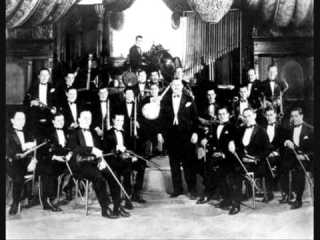Paul Whiteman and His Orchestra 1924
Paul Whiteman and His Orchestra 1924

1.Alabamy Bound 12/29/1924 2.California Here I Come 2/1/1924 3.Call of the South 12/29/1924 4.Doo Wacka Doo 9/5/1924 5.Fascinating Rhythm 12/29/1924 6.Gotta Get A Girl 12/16/1924 7.Hard Hearted Hannah 9/2/1924 8.Home in Pasadena 2/19/1924 9.I'll See You In My Dreams 12/19/1924 10.Indian Love Call 11/17/1924 11.It Had To Be You 4/8/1924 12.Lime House Blues 1/22/1924 13.Meditation from Thais 6/12/1924 14.My Road 9/15/1924 15.My Twilight Rose 9/12/1924 16.Oh, Lady Be Good! 12/29/1924 17.Rhapsody In Blue (1924) 6/10/1924 18.Rose-Marie 9/18/1924 19.San 6/9/1924 20.Somebody Loves Me 7/11/1924 21.Suite of Serenades (acoustic) 6/11/1924 22.Tell Her in the Springtime 11/17/1924 23.The Hoo Doo Man 5/2/1924 24.What'll I Do 3/18/1924 25.Where the Dreamy Wabash Flows 8/13/1924 26.Where the Rainbow Ends 5/3/1924
1924 marked the final year for acoustically recorded phonograph records and the Victor Talking Machine Company lost no time pursuing electrical recording with the Western Electric Company System that became commercially available in 1925. Meanwhile Victor truly perfected the art of good recording with the old acoustic methods. This collection features the Paul Whiteman Orchestra before and after Paul's concert in 1924 "An Experiment in Modern Music" representing some very fine acoustically recorded performances. The Whiteman Orchestra even with the limits of the recording systems of the time sounded fuller than other bands, and the orchestrations are rich. Within these scores there is a similar pattern of orchestration using cornetist Henry Busse and reed player Ross Gorman that suggests the Bix and Tram pairings after 1927. This was typical of most Whiteman scores that pairs off soloists whether they be brass or reed players.
Also interesting within this group of recordings are many instances of "doo-wacka-doo" in the songs. Whiteman sees to it that his brass sections, his reeds, and if I heard correctly, even his banjoist, Mike Pingatore, utilize this musical idiom, which seemed to exist wildly in 1924. Later 1920's music scores do not resort to it. Even Billy Murray gets a vocal with Whiteman on the appropriately titled "Doo Wacka Doo."
I like San, the acoustic version as a contrast to the electric version made 4 years later with Bix, Tram, and the Dorsey Brothers. In the 1924 session there is some growling cornet work by Henry Busse and some good reed work by Ross Gorman. In the last third of the recording there is something going on that sounds like "razzing." I think it is Willie Hall on the bicycle pump with a kazoo attached. He was great for gimmicks during live performances. You can see an example of his act in the King Of Jazz movie from 1930. The sketch is called "Willie Hall - one of the boys." I think San is a classic piece of Jazz from the Jazz Age.
The Rhapsody in Blue is Gershwin's masterpiece with the acoustic version represented herein. I think it is still a great piece of American Music as are the many songs herein that are represented in the American Songbook. Please give this collection a good listen. If you do not enjoy a good speaker system with your computer listen through headphones. The listening experience is great. ---archive.org
download (mp3 @128 kbs):
uploaded yandex 4shared mega mediafire solidfiles zalivalka cloudmailru oboom
Zmieniony (Czwartek, 02 Kwiecień 2015 13:44)








